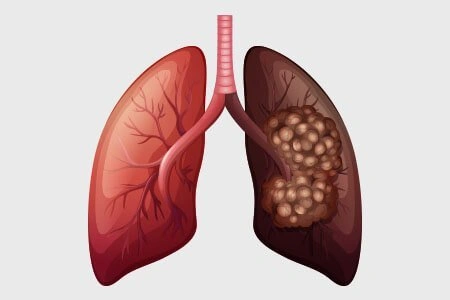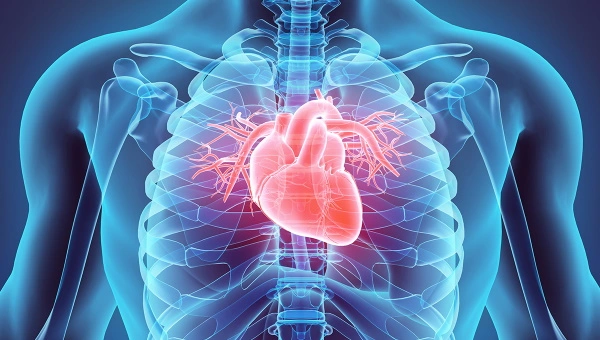Lung cancer genetic

If you tested your DNA with a personal genomics service like 23andMe, AncestryDNA, FamilyTreeDNA, MyHeritage or another testing company, you can learn more about your risk factors for hundreds of diseases. By clicking the button above ⬆️, you can upload your raw DNA data file and receive a personalized 250-page health report with research links that is the most comprehensive.
Abnormal lung cells multiplying uncontrollably to form a tumor characterizes lung cancer. Early stages of the disease may not exhibit any signs or symptoms. However, some individuals may experience chest pain, frequent coughing, blood in the mucus, breathing difficulties, trouble swallowing or speaking, loss of appetite and weight loss, fatigue, or swelling in the face or neck. If the cancer metastasizes into other tissues, additional symptoms may arise. Lung cancer is most prevalent in individuals in their sixties or seventies. While long-term tobacco smoking is a common risk factor, non-smokers can also develop the condition.
When observed under a microscope, the size of the affected cells determines the classification of lung cancer into two main types: small cell lung cancer and non-small cell lung cancer. The latter type is more prevalent, accounting for 85 percent of all lung cancer cases, while the former makes up the remaining 15 percent.
Lung cancers frequently exhibit somatic mutations in the TP53, EGFR, and KRAS genes. The TP53 gene encodes the p53 protein, which is present in the nucleus of cells and directly binds to DNA. This protein regulates cell growth and division by monitoring DNA damage and deciding whether to repair the DNA or initiate apoptosis. The EGFR and KRAS genes encode proteins that are integrated into the cell membrane. When these proteins bind to other molecules and become activated, they initiate signaling pathways that promote cell proliferation.
When the TP53 gene undergoes mutations, it leads to the creation of a modified p53 protein that is unable to bind to DNA. This altered protein is ineffective in regulating cell proliferation and permits the accumulation of DNA damage in cells. Consequently, such cells may undergo uncontrolled division, resulting in the growth of tumors. On the other hand, mutations in the EGFR or KRAS gene cause the production of a protein that is persistently activated. This leads to a continuous signal for cell proliferation, which ultimately leads to the formation of tumors. When these genetic alterations occur in lung cells, it results in the development of lung cancer.
Lung cancer cases have shown the recurrence of mutations in numerous genes. These genes primarily regulate gene expression, cell proliferation, differentiation, and apoptosis.
Follow the link of the selected polymorphism to read a brief description of how the selected polymorphism affects Cancer of respiratory organs and see a list of existing studies.
SNP polymorphisms related to the topic Cancer of respiratory organs:
| rs10937405 | TP63 variations are associated with predisposition to lung adenocarcinoma. |
| rs4324798 | The TERT-CLPTM1L lung cancer susceptibility variant is associated with higher DNA adduct formation in the lungs and lung cancer susceptibility. |
| rs3117582 | The SNP BAG6 rs3117582 polymorphism is associated with non-small cell lung cancer. |
| rs16969968 | The nicotinic acetylcholine receptor risk allele in CHRNA5 causes a higher risk of nicotine dependence, lung cancer, but a lower risk of cocaine dependence. |
| rs763317 | SNP of EGFR intron 1 increases 3.5-fold the risk of lung adenocarcinoma disease. |
| rs7086803 | Single nucleotide polymorphisms in the VTI1A gene contribute to susceptibility to non-small cell lung cancer. |
| rs61764370 | KRAS-LCS6 polymorphism (rs61764370) is associated with different types of tumours - colorectal cancer, breast cancer, non-small cell lung cancer and brain tumours. |
| rs2853677 | Genetic variation in the TERT gene is associated with predisposition to non-small cell lung cancer and leukaemia. |
| rs1051730 | CHRNA3 single nucleotide polymorphism increases the risk of lung cancer by 1.8 times. It also contributes to a decreased response to alcohol, so there may be an increased risk of alcohol abuse. |
| rs2808630 | C-reactive protein (CRP) gene polymorphisms are associated with risk of lung cancer. |
| rs4488809 | A TP63 genetic variant at locus 3q28 is associated with risk of lung adenocarcinoma among never-smoking women. |
| rs8034191 | A region of chromosome 5p15 associated with the risk of adenocarcinoma. |
| rs13180 | |
| rs17576 | |
| rs31489 | |
| rs31490 | |
| rs36600 | |
| rs401681 | |
| rs402710 | |
| rs707939 | |
| rs753955 | |
| rs805293 | |
| rs805297 | |
| rs1267601 | |
| rs1267622 | |
| rs1270942 | |
| rs1316971 | |
| rs1530057 | |
| rs1663689 | |
| rs1802127 | |
| rs1926203 | |
| rs2250889 | |
| rs2352028 | |
| rs2395185 | |
| rs2684799 | |
| rs2684807 | |
| rs2736100 | |
| rs2895680 | |
| rs3131379 | |
| rs3749971 | |
| rs3750861 | |
| rs3817963 | |
| rs4254535 | |
| rs4461039 | |
| rs4809957 | |
| rs4975616 | |
| rs6141383 | |
| rs6489769 | |
| rs6740703 | |
| rs7170035 | |
| rs7216064 | |
| rs7591913 | |
| rs7727912 | |
| rs8042374 | |
| rs9387478 | |
| rs10197940 | |
| rs10508266 | |
| rs10849605 | |
| rs11571833 | |
| rs12296850 | |
| rs12440014 | |
| rs12613938 | |
| rs12914385 | |
| rs13314271 | |
| rs17879961 | |
About The Author
Li DaliLi Dali, a National Foundation for Outstanding Youth Fund recipient, is a researcher at the School of Life Sciences in East China Normal University. He earned his PhD in genetics from Hunan Normal University in 2007 and conducted collaborative research at Texas A&M University during his doctoral studies. Li Dali and his team have optimized and innovated gene editing technology, leading to the establishment of a world-class system for constructing gene editing disease models.


